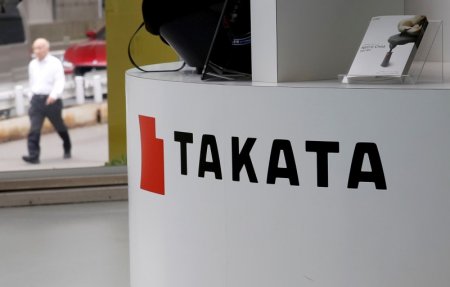 Thomson ReutersLogo of Takata Corp is seen on its display at a showroom for vehicles in Tokyo
Thomson ReutersLogo of Takata Corp is seen on its display at a showroom for vehicles in Tokyo
By Naomi Tajitsu and Maki Shiraki
TOKYO (Reuters) – Investment bank Lazard has sidelined the founding family of Takata Corp as momentum builds to a market-based solution for the Japanese air bag maker embroiled in the auto industry’s biggest safety recall, a person briefed on the process told Reuters.
Lazard, hired by Takata’s steering committee just two weeks ago to lead the financial restructuring process, is firmly in the driving seat after taking control from Takata’s board and the Takada family, which have struggled to make much headway in talks with automaker customers, said the person, who did not want to be named because of the private nature of the discussions.
“Now they have an international player driving the process, communicating with the automakers won’t be an issue,” the person said. “If it had been four friends of CEO Shigehisa Takada, sitting around in a Tokyo boardroom, the OEMs (automakers) would never accept that.”
“Even though you’re not going to have every automaker delighted with the outcome, there is a very strong sense now that they can achieve an outcome,” the person added.
Both Takata and Lazard declined to comment.
Since Lazard was brought in potential investors in Takata have stepped forward, including private equity fund KKR and Chinese auto supplier Ningbo Joyson Electronic Corp .
More than 100 million vehicles worldwide have been recalled over faulty Takata air bag inflators that are linked to 13 deaths and more than 100 injuries. New recalls are being announced on a near weekly basis.
To date, automakers that use air bags from Takata, one of three major global suppliers, have paid for the cost of the recalls as Takata has yet to agree on what is the root cause of the fault with its bag inflators.
COST BURDEN
Some carmakers, frustrated over how long it is taking Takata to identify and replace the potentially lethal inflators, now realize they will likely have to bear some of the burden to overhaul Takata, people with knowledge of those discussions say.
There is a recognition that the industry needs to keep Takata going, in whatever form, to guarantee stable air bag supplies.
“Automakers appear to be bracing for the possibility of forgiving some of Takata’s debts,” said one of those people. “That’s the direction things are heading in, and it’s happening quicker than we thought.”
“We want an outcome that will not burden our customers, so it’s not about where the (financial) sponsor comes from,” said an official from one Japanese automaker, who did not want to be named because of the sensitivity of the matter. “What matters is the plan, not necessarily who is proposing the plan.”
The Japanese government also seems increasingly unlikely to step in and insist on an old-style ‘Japan Inc’ rescue like those orchestrated in the past by the trade ministry (METI).
A METI source said the ministry would likely go along with any investor who can guarantee the safety of Takata’s product supply, adding that as Takata’s products aren’t technologically sensitive, there would not be any concerns about Japan losing expertise or cross-border security issues if foreign interests were involved.
(Reporting by Naomi Tajitsu and Maki Shiraki, with additional reporting by Taiga Uranaka and Ami Miyazaki in TOKYO; Editing by Ian Geoghegan)
Read the original article on Reuters. Copyright 2016. Follow Reuters on Twitter.
More from Reuters:
- Drugs for schizophrenics regularly dispensed to foster kids
- Venezuela opposition lawmakers say they were attacked during anti-Maduro protest
- California attorney general slams sentence in Stanford sex assault case
- Singapore PM says “sophisticated” cyber attacks prompt internet shutdown on government computers
- U.N.’s Ban says funding cuts threatened after Saudi coalition blacklisting













